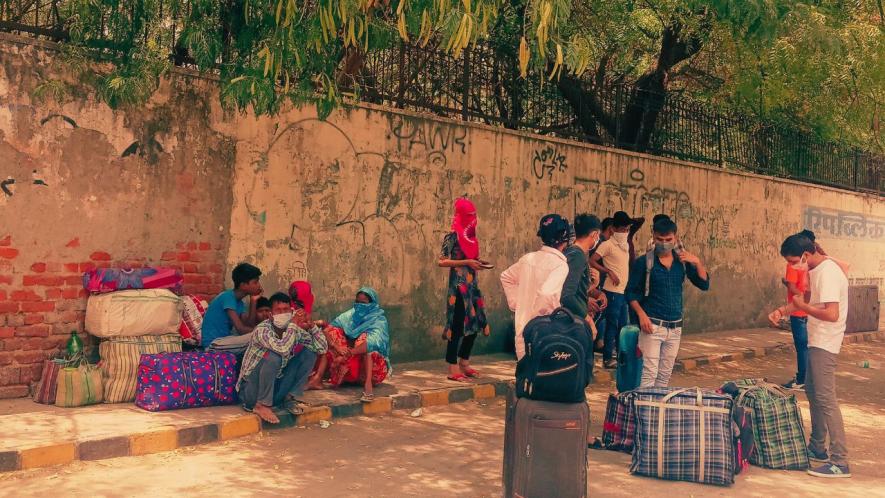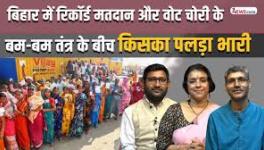‘Garbage in, Garbage Out’: A Case Against Inequality’s Excuses

Representational Image. Image Courtesy: Wikimedia Commons
There’s something undeniably reassuring about easy narratives. Consider the views advanced by Columbia University Professor of Social Policy, Neeraj Kaushal, in her Times of India essay “Why People Leave Equal Bihar For Unequal Mumbai.” Readers are told, with disarming clarity, that discussions about India’s economic inequality are simply a case of “garbage in, garbage out.” The “crucial factor” we should be looking at is migration.
Take, for instance, the flow from Bihar’s relative equality to Mumbai’s glaring disparities. Yet arguments like these, wrapped in the rhetoric of opportunity, all too often trip over their own intellectual contradictions. They inevitably end up falling into the same trap of “garbage in, garbage out”.
Let’s not fall for the seductively simple idea that migration between regions shows “preference for opportunity” and a “disdain for equality.” Human movement is almost never about seeking inequality for its own sake; it is driven by the hope for a better life, for the possibility of broad-based prosperity.
Unless we are shown that prosperity itself is a result of stark inequalities of income and wealth (in fact, evidence points to the contrary, as I will show later) the facile comparisons made by the esteemed Columbia professor makes no sense.
Moreover, one finds no acknowledgement in her essay that inequality itself radically conditions which opportunities exist, and for whom. The correct question is not whether Bihar’s relative equality is less attractive than Mumbai’s notorious stratification. The correct question is: does Mumbai’s inequality create more prosperity for the many, or does it barricade fortunes against most who enter its gates?
Equally, is Bihar’s poverty the child of its equality, or would the misery deepen under larger disparities? The failure to hold other things constant, ceteris paribus, something known to even high school students these days, simply eludes the esteemed professor.
In her essay, Kaushal repeats the cliché of the United States being unequal, yet rich. But absent from her narrative are the Nordic states—Denmark, Finland, Norway, Sweden— countries just as rich, yet far more equal. Their lowest earners are significantly better off than their American counterparts, a persistent issue in American politics. Why shouldn’t the US at least match Nordic levels of equality given its income? Is this disparity the result of natural law or deliberate policy choices? Kaushal never asks.
We later see another familiar claim in her essay: that the inequalities that matter are those in human capital and health, not in ‘garbage in, garbage out’ of inequality of outcomes— such as those of income and wealth. But those who make this claim seldom reflect that correcting these former sorts of inequalities requires correction in latter sort of inequalities. What else have Thomas Piketty and his colleagues argued when proposing a ‘crorepati’ tax justice plan? That a modest wealth tax on crorepatis in India—whose net wealth exceeds Rs 10 crore—will create fiscal space for government spending on health and education, which is currently abysmally low by any standard.
Since those who dismiss inequalities in income and wealth as mere “distraction” are unlikely to be aware of its impact on collective prosperity, they should take a look at OECD’s report titled “In It Together: Why Less Inequality Benefits All.” Under the heading “Higher inequality drags down economic growth”, the report emphatically states that it empirically found “consistent evidence” that growing income inequality placed a “significant” brake on long-term economic growth of countries. Between 1985 and 2005, across 19 OECD countries, a rise of two Gini points—a modest shift—knocked 4.7 percentage points off cumulative growth.
The report also found that attempts to redistribute—through taxes and benefits—do not slow growth, but support it. And if you imagine this to be true only for developed nations, read the report further. It highlights that economic inequality “affects even more emerging economies.” It continues: “despite often impressive growth rates and reductions in absolute poverty, high and sometimes very high levels of income inequalities in emerging economies are found to undermine their long-term growth potential.”
The reason is not obscure. More inequality means the rich seize opportunities far better, faster, wider than the poor. For poor families, educational dreams are truncated by costs, hampered by access, and future fortunes vanish for want of a loan, a ladder, or leverage. The result: economic growth that is slower, less broad-based, and more exclusionary.
The World Bank, in its report released the very next year after OECD’s, reinforced the same lesson: inequality exacts financial costs, stifles growth, and creates social and political pressures well beyond numbers. Levelling the playing field not just increases efficiency, but it’s also a matter of justice and fairness.
Legendary Nobel laureate economist Robert Solow, specialising in economic growth, saw this plainly. In his words, a “highly unequal society is not exploiting its full potential for growth.” He termed those who parrot “equality of opportunity” while dismissing “equality of outcome” as “phoney.”
The shaping of opportunities by prior outcomes was obvious to him—as it should be to anyone else paying attention. Thus, to foster genuine improvement, we must resist facile comparisons between “equal Bihar” and “unequal Mumbai.”
The central task is to examine how Mumbai’s inequalities undermine prospects for its lower half. Hold other factors constant, isolate impact—do the basic analysis. Otherwise, risk ending up, in Solow’s words, as “phoney.”
The writer has a background in economics from Jamia Millia Islamia University and analytics from Delhi School of Economics. He runs an Instagram page and YouTube channel on economics. The views are personal.
Get the latest reports & analysis with people's perspective on Protests, movements & deep analytical videos, discussions of the current affairs in your Telegram app. Subscribe to NewsClick's Telegram channel & get Real-Time updates on stories, as they get published on our website.
























